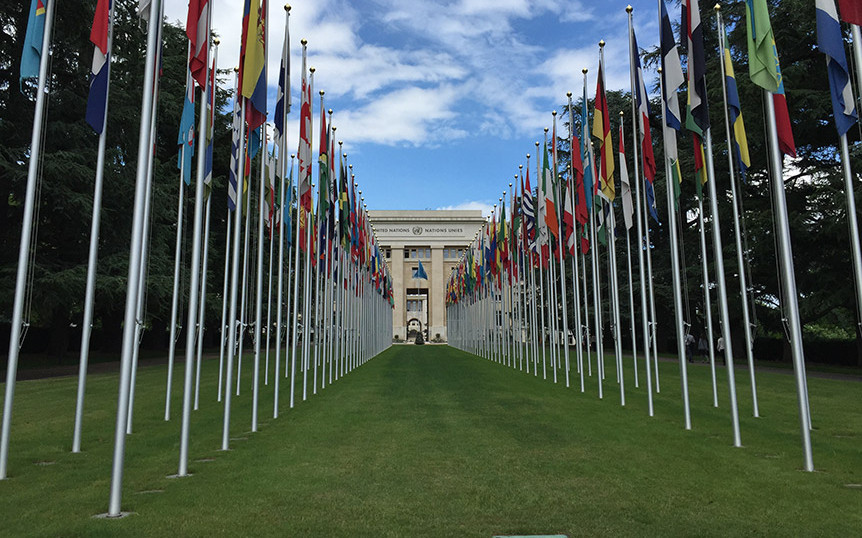27 February 2019 – Today, at the 40th session of the United Nations Human Rights Council, Ahmed Abdulrahman Al-Jarman, the United Arab Emirates’ (UAE) Assistant Minister for Human Rights, delivered remarks claiming the UAE’s commitment to human rights. He called attention to his government’s support for the Yemeni government, attempted to highlight the role the UAE plays in ensuring regional stability, and highlighted the Emirates’ economic progress, development, and commitment to tolerance. Americans for Democracy & Human Rights in Bahrain (ADHRB) takes this opportunity to respond to the Foreign Minister’s remarks and to condemn the UAE’s human rights record.
In his speech, the Foreign Minister noted the war in Yemen, condemning extremism and terrorism and blaming the Houthis for the ongoing violence. Despite this, the minister neglected to discuss the UAE’s role in the violence and the conflict. According to the Group of Emminent Experts (GEE), the Emirati government arms and funds multiple militia groups that operate within Yemeni government-held territory. They run several prisons in southern Yemen and they have been accused by the GEE of engaging in rampant torture and sexual assault of inmates. Credible allegations have emerged that security force personnel have sexually tortured women detained in the facilities.
In addition to supporting militias in Yemen that engage in serious human rights abuses, the UAE government has funneled weapons to parties engaged in the war, including to UAE-backed militia groups. Indeed, Amnesty International has found that some of the weapons and material the UAE purchases from the United States and European countries are funneled to various armed factions in Yemen that are not overseen by any party and that often engage in many human right abuses. Amnesty further documented that many of the militia groups that receive Emirati support, including military grade trucks, guns, and mortars, have connections to terrorist organizations, that may ultimately receive these weapons.
In addition to aiding and abetting rights abuses in Yemen, the Emirati government continues to restrict fundamental rights in the United Arab Emirates. While the Foreign Minister extolled the virtues of the Emirati economy, his government’s role in promoting regional security, and attempts to promote tolerance, he did not mention the extensive efforts the government has taken to suppress all dissent and imprison peaceful critics.
The UAE government utilizes its cybercrime law and other restrictive, and vague, legislative mechanisms to target and imprison human rights defenders and dissidents. The government also installed a high-tech system of cyber-surveillance that uses fear and intimidation to ensure compliance with the government. Among the activists who are currently imprisoned for speaking out against the government are economist and academic Dr. Nasser bin Ghaith and rights defender Ahmed Mansoor.
Authorities arrested Dr. Nasser bin Ghaith in August 2015 after he made comments on Twitter that were critical of the Egyptian government. In March 2017, he was sentenced to ten years in prison under the cybercrime law. Also in March 2017, an Emirati court sentenced Jordanian journalist Tayseer al-Najjar to three years in jail and fined him 500,000 dirhams (136,000USD) for comments he made on Facebook allegedly “insulting the state’s symbols” Also in March 2017, officials arrested human rights defender Ahmed Mansoor on the basis of free expression charges, including calling for the release of the detained human rights defender Osama al-Najjar. His ten-year prison sentence was upheld in December 2018. Even as the government imprisoned Dr. bin Ghaith, Mansoor, and Tayseer al-Najjar, other dissidents, including lawyers Mohammed al-Roken and Mohammed al-Mansoori have faced detention and imprisonment for free express-related crimes. The UAE’s attempts to promote tolerance and dialogue stand in stark contrast to the government’s systematic repression of dissent and political expression.
The UAE took the floor of the UN Human Rights Council to proclaim its commitment to human rights and fundamental freedoms. We call attention to the Emirate’s human rights practices, and highlight the detention and arrests of activists, dissidents, and human rights defenders who are critical of the government and its policies. We urge the UAE government to relax restrictions on speech and to bring its laws into accord with international human rights standards and to release all prisoners sentenced on the basis of their expression. ADHRB further calls attention to the UAE’s actions in Yemen and how it funds and supports violent militias that systematically violate human rights. We urge the US and its European partners to stop selling weapons to the UAE and to take steps to ensure the UAE and its coalition partners in Yemen respect human rights standards.





